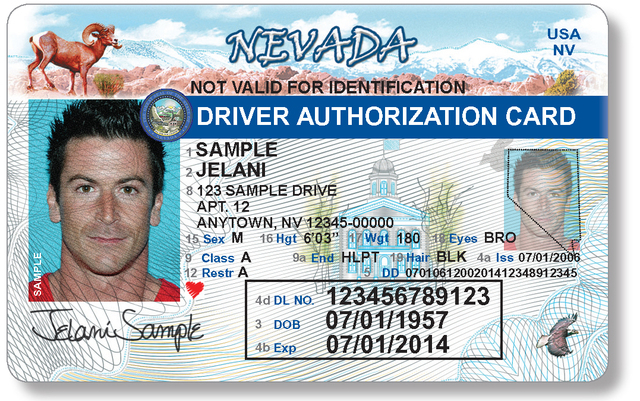Rules OK’d for Nevada driver authorization cards that start Jan. 2

CARSON CITY — Are you in the country illegally? Don’t speak English?
It doesn’t matter. You still will be able to get a license starting Jan. 2 that will allow you to drive legally in Nevada.
Visit the recently updated Department of Motor Vehicles website to learn all the details, including tips on Nevada driving rules. Written tests for legal residents are offered in both English and Spanish, but there is no guarantee for this new group of applicants the driving test instructor will speak Spanish.
The Legislative Commission on Tuesday approved regulations for the driver authorization card program. DMV must wait until January to accept and process those applications because enabling legislation, Senate Bill 303, specified a 2014 start date.
As many as 60,000 immigrants in the United States illegally are expected to apply for the new licenses, which will cost $22.25 a year, or about four times the cost of a regular license. The driving test costs $25.
The new licenses look a lot like the regular driver’s license except for a big red “Driver Authorization Card” in the center. They cannot be used as identification cards, according to the law.
The website includes all the information applicants will need to know about driving in Nevada and what to bring to a DMV office when they go in for a driver authorization card. Most of the information is in both English and Spanish.
An application form can be found on the website to fill out and bring to the DMV office.
Senate Majority Leader Mo Denis, D-Las Vegas, led the move to pass the bill creating the new licenses. He won unanimous Senate approval, with overwhelming support in the Assembly. Every Democrat and 15 of the 25 Republicans supported the bill.
Denis and others testified the new licenses will lead to greater safety on the roads. Besides passing written and road tests, motorists also must buy liability insurance, like other drivers, if they purchase a car.
Denis testified that residents in the country illegally now often drive without licenses and might try to flee if they are involved in accidents.
“This is not about politics,” said Gov. Brian Sandoval when he signed the bill. “This is about making roads safer. This is good for everybody.”
DMV spokesman David Fierro said his agency can use the time before Jan. 2 to program computers, train workers and set up a translation program to help prospective drivers prove their identities.
The enabling law requires applicants to prove their identities through foreign birth certificates and other means. The applicants must present translations of the documents when they arrive at the DMV. The agency will post on its website a list of approved translators.
Fierro said some nonprofit groups have mentioned they might provide translations for free. Others may charge prospective drivers for translations.
Eighteen bilingual workers have been hired by the DMV and are in training for the Jan. 2 rollout. But DMV officials do not want them to translate documents when applicants approach counters.
Fourteen workers will be based in Clark County, which has Nevada’s largest undocumented worker population.
California Gov. Jerry Brown on Oct. 3 signed a driver authorization card bill, but that program is many months away from issuing the cards.
Utah, Washington state, Illinois and New Mexico already have driver authorization cards.
Fierro said DMVs around the nation have agreements to accept each other’s laws. While that means the other states should accept the cards, he advised people to check with their highway patrols.
Contact Capital Bureau Chief Ed Vogel at evogel@reviewjournal.com or 775-687-3901.












